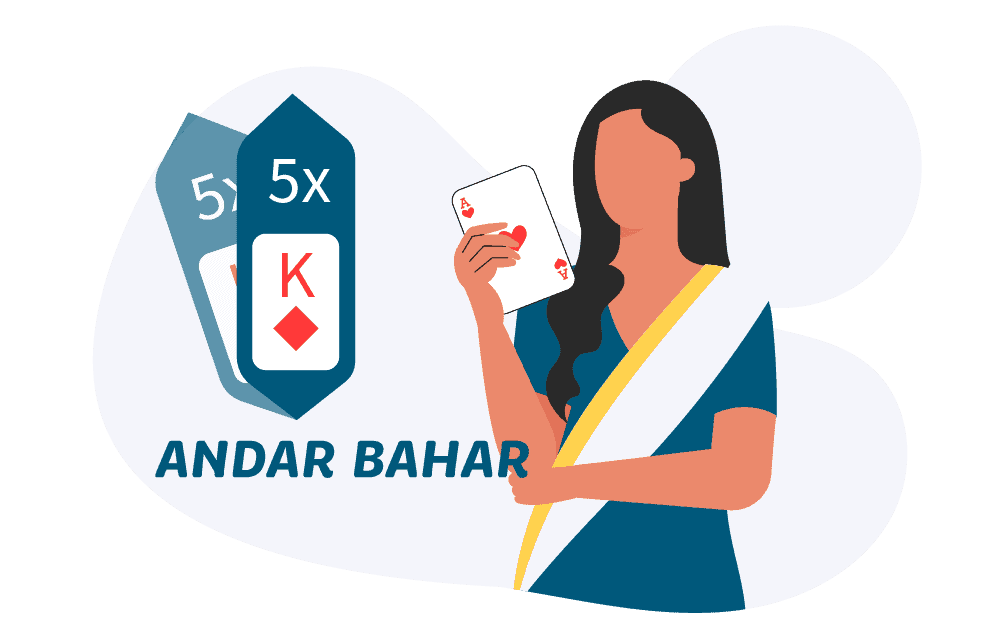Andar Bahar is a classic card game, immensely popular all over India. Played both by serious gamblers and simply for fun at social gatherings, it is also known as Mangatha, Katti*, Ullae Veliyae and Cut Patta.
What Kind of Game is Andar Bahar?
India’s deep-running passion for gambling has brought with it through the centuries several traditional desi games which remain hugely popular on the Subcontinent. Much like several other beloved Indian games – e.g. Rummy or Teen Patti – it is handed down through generations as a simple but fun pastime. Gambling implications are an added value to its practice but not a core motivation for it since you can even see kids flipping the cards away for a few fruit seeds or buttons if the real money is hard to come by.
Andar Bahar is gaining popularity online these days but it has been part of physical social life for centuries. Possibly involving more than a couple of players, its simple rules ask participants to observe a deck of cards being dealt face up both sides of a “middle card” and guess, beforehand, on which side of that card will a card land which matches the value of the middle card. Hence the name of the game – “Andar Bahar” in English means “Inside [and] Outside” or simply “In/Out”.
Much like roulette, slots and the lottery, Andar Bahar is mostly a game of chance rather than skill, despite some variations aiming to introduce a more significant discretional element. Players bet on a precise card coming up but also on a suit, colour, above and below a certain card value, the other player’s chances or even the number of cards dealt before the game comes to an end. Andar Bahar involves betting rather than gaming, in the end.
Brief Historical Background of Indian Gambling Leading to Andar Bahar
Gambling chronicles in India tell a story dating back to the Harappa Civilization. Unrelated excavations have unearthed terracotta dice sets, testifying to an ancient appreciation of this kind of simple yet absorbing game, probably the oldest existing in any culture. The Mahabharata, one of the most important and legendary Indian scriptures, narrates of gambling quarrels and dice games even leading to a war.
Truth be told, many of the most famous board and table games originated in India. Some stand alone as a gaming genre – Chess (known as Ashtapada and played originally with dice) and Ludo (Pachisi, again with dice) had the necessary competitive character to stimulate betting and gambling. Others, like Snakes & Ladders, were used to teach moral lessons and perseverance.
With time, cloth pieces (Krida-Patram) with Ramayana and Mahabharata motifs evolved into present-day cards. Sandstone dice were increasingly used and incorporated into board games. But India’s enduring love affair with gaming and gambling has remained intact, producing new variations of the traditional genres.
Popular Origin as a Simple Card Game
Andar Bahar stands prominent among original desi games. Even Paplu is a variance of Rummy, while Teen Patti (also called Indian Poker) is a version of the British “Three-Card Brag”.
Scarce documentary evidence still points to Andar Bahar’s origins in Bengaluru (Bangalore) and the state of Karnataka. The local name for the game is Ullae Veliyae, while Andar Bahar is its translation in Hindi. The simplicity of the game is what has made it immensely popular – from South India, it has spread and taken root all across the country. Neighbouring South Asian countries are familiar with it, if not as passionate about it.
Andar Bahar’s effortless understanding and fun gameplay have made it suitable for friends and family gatherings, even with kids, with guessing and an exchange or betting of chips, tokens, coins or seeds all it took to make it more competitive. You can see Indians play Andar Bahar even on the streets or in informal game rooms, frequently run by shady operators.
Andar Bahar payouts also seem rather attractive: if you guess the winning card on the Andar side (same place where the first card was dealt), the payout typically is at 90% on top of the bet; if it happens to be on the Bahar side, it’s even 100%, double the bet. Thus, the house margin remains around and even under 5%.
Quick rounds mean practically nonstop chances to bet again, and the easy-to-follow gameplay makes it a favourite alternative to more complex casino games. The game’s popularity has led to a massive amount of cash being involved in informal and illegal Andar Bahar sessions.
*Katti as a Variation of Andar Bahar
One can also happen to see the game called Katti, improperly. Katti is technically different: instead of one card being open in the middle, there are 13 cards dealt face up in the beginning. After the bets are made, players must choose one card from the 13 to be the one (sought) to solve the game.
Andar Bahar as Part of Present Desi Culture
As most of us (with some knowledge of the Indian gaming scene) are aware, games of chance are largely outlawed except in three states (Goa, Daman and Sikkim). Thankfully, both skill games and online gaming are allowed. Card games seek their place in the sun mostly in the latter way, nowadays, with brick-and-mortar casinos being few and far away, as well as travel and access potentially problematic, as we all learnt the hard way.
Indian players have always been passionate about their card games. A 2019 study in largely educated Goa shows that around 8% of adults gamble on cards regularly, with 96% of those players doing it three times a month on average. We must keep in mind that Goa has physical casinos on its territory, although sometimes resulting difficult to enter for many residents, as well as expensive.
Another recent study by the International Centre for Sports Security found out that “in the last ten years, 80% of Indians have wagered at least once yearly on sports, slots, lottery, horse racing, video poker, and card games, notably Teen Patti and Andar Bahar.” Such trends lead to an average annual growth rate of 20% of the market, forecast to be INR 250 billion by 2024.
Furthermore, what plays in favour of authentic local games is the fact that Indians are proud of their roots and enjoy rediscovering traditional entertainment and cultural heritage in “all things Indian”. Gambling undoubtedly is one of those things, and as far as card games go, there is nothing more desi than Andar Bahar.
Current Gambling Context of Andar Bahar
The above mention of gambling regulation serves only to remind of the fragmented Indian gaming environment, at least regarding physical presence at betting or gambling establishments. However, the overwhelming popularity of card games such as Andar Bahar has made it nearly impossible to suppress most forms and means of their practice, as they are virtually ubiquitous.
In 2016 the High Court in Bangalore decided that it was difficult if not impossible to categorise Andar Bahar as a “game of chance”. Neither the police managed to establish it after catching and investigating a group of players, nor previous court decisions went in that direction. The way the game is played, the bets placed and recorded do not make it fully as a game of chance – that much was already established in a 1977 High Court judgement (Eranna and Others vs. the State of Karnataka), going as far as declaring it “may be a game of skill”.
Most importantly, courts tend to regularly quash cases which see Andar Bahar played in private settings, not in a game house. In a pragmatic interpretation of the archaic gambling laws, restrictions and punishments tend to be enforced only when someone is caught organising an illegal gambling house, even a temporary one. Mostly, average Indians play for fun, indulging in small-time social gambling. The most that courts are willing to “punish” such offenders is a small fine, maybe a day’s detention.
Because people do play Andar Bahar everywhere and all the time. At home with friends, in boat repair yards, at social and family gatherings. And most courts would support the claim that “a bet placed for a petty amount with relatives and friends to kill time cannot be termed as gambling”. Moreover, raiding people’s homes on mere allegations of gambling is seen as “abuse of the Law” and not as enforcing it. The worst consequences for those caught actually might entail their cash being seized.
All these practices lead to the conclusion that, beyond any doubt, Andar Bahar is an intrinsic part of Indian entertainment and daily culture. And playing at home with friends is acceptable while organising a betting house never is.
Moving up to an Online Gaming Environment
Despite the above lenient view and with Andar Bahar widely approved of by families and co-workers, land-based casinos remained its main territory for many decades. Those are, as we know, not evenly distributed across India and not nearly sufficient enough to quench the thirst for the game amongst millions of desi players.
With mobile devices enjoying rapid penetration and online services growing incrementally year-on-year, Andar Bahar inevitably went digital. When COVID-19 added to the limitations imposed by the laws and the few casinos out there, it was probably only the last drop that made the cup run over for everyone.
Indian Andar Bahar players increasingly choose safe offshore online casinos for their passion. Accessed easily and instantly, hassle-free and available anywhere and anytime online gaming platforms have become the medium of choice for more than 400 million players, many of whom insist with their favourite traditional card games.
A recent surging trend in developing localised content goes also in support of those same favourite desi games. Largely based on the sector-defining mobile versions and Apps (with India as the second largest App download market globally), online games offer language versions in many Indian languages such as Hindi, Bengali, Marathi or Telugu.
The leading Andar Bahar game providers on the market probably remain Ezugi and OneTouch. And even though many providers and operators have noticed the incredible potential and specifics of the Indian market over the past few years, the online gaming environment is already thriving and rapidly expanding. Andar Bahar alone is offered in several online variations and play modes such as Speed Andar Bahar or Live Andar Bahar with a dealer.
Put simply, there is much less probability that a foreign online gaming operator might be successful in the long run on the Indian market if they do not offer the local favourites such as Andar Bahar, Teen Patti or Rummy. With the eyes of the internet casino industry firmly on India, it comes as no surprise that the majority do support this top-performing card game.
Pop Culture References to the Name “Andar Bahar”
A search for the word combination (or Andar Bahaar) may bring out a 1984 Hindi action thriller film which is loosely based on the classic Hollywood cop movie “48 Hours” with Eddie Murphy and Nick Nolte.
There is also a 2013 Kannada (language) action movie by the same name which was also received well by the public.
Essentially, the generic meaning of the name may bring out a few irrelevant search and pop reference results. Nevertheless, as a combination, it has been established predominantly in connection to the card game.
The Importance of Andar Bahar in Indian Gaming Culture – a Summary
Andar Bahar is a prime example of a simple, traditional and original Indian card game. A conventional gambling choice, it is also played for casual fun and a friendly pastime. With South-Indian origins running centuries deep, it has evaded strict law enforcement and is practised all over the country.
Present-day online gaming communities enjoy Andar Bahar just as much as conventional players have remained loyal to its social and gambling functions. Dedicated Apps, language versions and full online casino platform integration have helped carry over Andar Bahar’s top choice status to a new and immense digital tribe of players.


